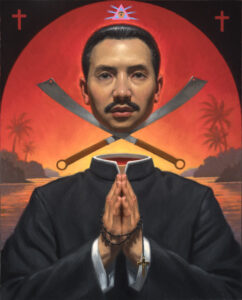Editors’ note: Side by Side is a new occasional series where we take two contemporary thinkers and simply juxtapose their ideas side by side and let you, the reader, ponder and draw conclusions. In some cases they will be paradoxical or contradictory ideas, sometimes great minds thinking alike. In this case we take these two distinguished men’s meditations on unaccepted suffering and its consequences.
Jordan Peterson is a distinguished Toronto psychology professor, clinical psychologist, also now best-selling author of 12 Rules for Life, who became famous for refusing to obey a proposed Canadian law mandating transgender pronouns. Prof. Peterson sometimes describes himself as an atheist, sometimes says he is a Christian, sometimes says he lives as if Christianity is true, and sometimes says it depends on what you mean by words like “Christian” and “faith.” It’s complicated.
Joseph Pearce is Tolkien & Lewis Chair in Literary Studies at Holy Apostles College & Seminary, the editor of the St. Austin Review and senior editor at the Augustine Institute. His latest book is Further Up and further in: Understanding Narnia. His Catholic Arts Today Interview on “Death Comes for the War Poets” is here. He’s Catholic.
Joseph Pearce:
“In [Flannery O’Connor’s] ‘A Good Man is Hard to Find’ the real absence of this acceptance [of suffering], as revealed by the Misfit’s complaints about the suffering that he had experienced, leads to a desire to inflict suffering on others. The anger that is the bitter fruit of the Misfit’s non-acceptance is literally deadly, reaping havoc.
O’Connor presents us with another misfit in ‘Good Country People’, a misfit who makes a dark art of cynical indifferences…like the other Misfit, she feels that life has treated her badly and she hates life because of it, and, as for God, if He exists He is the One responsible for her hateful life. The sin of pride, the source of her bitterness, is made evident by the fact that she has effectively declared herself the god of her own cosmos, a fact revealed by O’Connor through the words of defiance that Hulga directs to her mother: ‘If you want me, here I am-LIKE I AM.’ This is clearly a thinly veiled reference to the name that God gives to Himself, when asked His name by Moses in the Book of Exodus: I Am Who I Am. This could be translated as Hulga utters it: “I am-LIKE I AM.” Hulga has not only changed her name, she has changed her religion. She now worships herself alone. She has declared herself god of herself. This, of course, is the de facto position of all relativists. In refusing to accept the existence of absolutes, including truth itself, they make themselves the sole arbiters of reality.”
“Flannery O’Connor: Misfit and Mystic” in the March/April 2018 Saint Austin Review.
Jordan Peterson:
“[T]hese murderous individuals had a problem with reality that existed at a religious depth. As one of the members of the Columbine duo wrote:
‘The human race isn’t worth fighting for, only worth killing. Give the Earth back to the animals. They deserve it infinitely more than we do. Nothing means anything anymore.’
People who think such things view Being itself as inequitable and harsh to the point of corruption, and human Being, in particular, as contemptible. They appoint themselves supreme adjudicators of reality and find it wanting….
Whenever we experience injustice, real or imagined; whenever we encounter tragedy or fall prey to the machinations of others; whenever we experience the horror and pain of our own apparently arbitrary limitation-the temptation to question Being and then to curse it rises fouly from the darkness. Why must innocent people suffer so terribly? What kind of bloody, horrible planet is this, anyway?…
The desire for vengeance, however justified, also bars the way to other productive thoughts. The American/English poet T.S. Eliot explained why, in his play, The Cocktail Party. One of his characters is not having a good time of it. She speaks of her profound unhappiness to a psychiatrist. She says she hopes that all her suffering is her own fault. The psychiatrist is taken aback. He asks why. She has thought long and hard about this, she says, and has come to the following conclusion: if it’s her fault, she might be able to do something about it. If it’s God’s fault, however-if reality itself is flawed, hell-bent on ensuring her misery-then she is doomed. She couldn’t change the structure of reality itself. But maybe she could change her own life.”
12 Rules for Life: An Antidote to Chaos (Random House Canada: 2018




